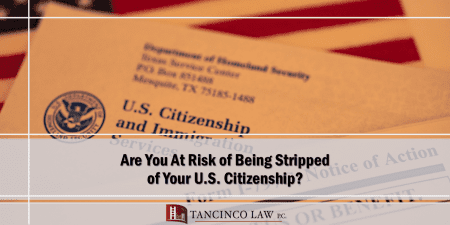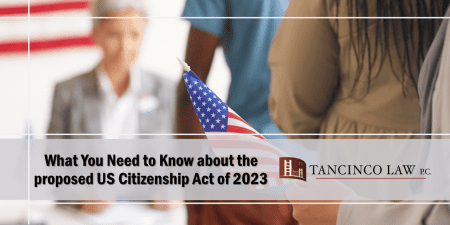
President Trump’s focus on immigration is on border security, undocumented immigration and enforcement of immigration law including a plan for a mass deportation. So far, there is no “denaturalization policy” that was expressed. It was during his prior administration that he created a Denaturalization Task Force and a Denaturalization Section targeted against U.S. citizens. What are the chances that this effort is going to be revived? And if you are a naturalized U.S. citizen are you at risk of being stripped of your U.S. Citizenship?
Denaturalization is found in Section 340 of the Immigration and Nationality Act. There are only certain legal basis to denaturalize an individual and this is initiated by the government through the federal district courts. In the past it was seldom utilized except in extreme cases like in denaturalization of former Nazis who lied about their past who illegally procured naturalization.
Those who are most likely to be affected by the administration’s effort to strip U.S. citizenship from naturalized citizens may be divided mainly into 3 categories. These are immigrants who procured their citizenship illegally because of the presence of:
- Prior criminal conviction that was concealed: Those who concealed their criminal convictions on their naturalization applications and their criminal cases are grounds for removal may have their cases referred for naturalization. Note that criminal charges or convictions must have occurred before and during the naturalization process.
- Prior removal cases and assumed identities: Several years ago, the U.S. government discovered hundreds of individuals who had prior deportation orders and who used different names in their green card and naturalization applications. These cases are now being investigated and may be re-opened for denaturalization.
- Material fraud and misrepresentation. This refers to those who lied in obtaining their green cards through fraud and misrepresentation. The lie must have a relation to the eligibility for green card or naturalization to be a basis for denaturalization.
Once an immigrant is identified for investigation by USCIS for purposes of denaturalization, the matter will be referred to the Department of Justice’s Denaturalization Section under the Office of Immigration Litigation and the Assistant U.S. Attorney. Thereafter, the case will be filed with the federal district court having jurisdiction over the residence of the immigrant being stripped of citizenship. When the case is filed with the court the naturalized U.S. citizen may present evidence to avoid denaturalization. Note that this is a judicial process and only a federal judge may strip one of U.S. citizenship. There is a due process involved and a right to a hearing. If a citizen is denaturalized, most probably this individual will be put in removal proceedings. Whether or not he will be deported depends on available relief or waivers.
Naturalized U.S. citizens must now realize that just like in the past Trump administration and now with the present administration. they no longer have a sense of permanence when it comes to their immigration status. If you believe that you fall into any of the categories of those who might be affected by this denaturalization effort of USCIS, it will be best to revisit and re-examine your naturalization application, have your case assessed by competent legal counsel. And, if there is a possibility of denaturalization, prepare yourself to defend yourself in the federal court and, in the worst case scenario, explore applicable waivers or defenses to avoid removal.
(Atty. Lourdes Tancinco is an immigration attorney and immigrant rights advocate based in the San Francisco Bay area and a partner at the Tancinco Law P.C., law firm established since 1992. She is also a producer/host of Pusong Pinoy sa Amerika, an immigration law informational show aired on GMA Pinoy TV. She may be reached at law@tancinco.com, www.tancinco.com, facebook/tancincolaw, or at 1-888-930-0808)



